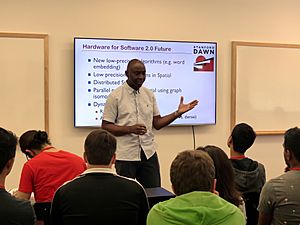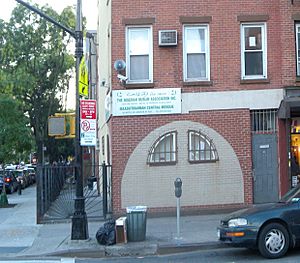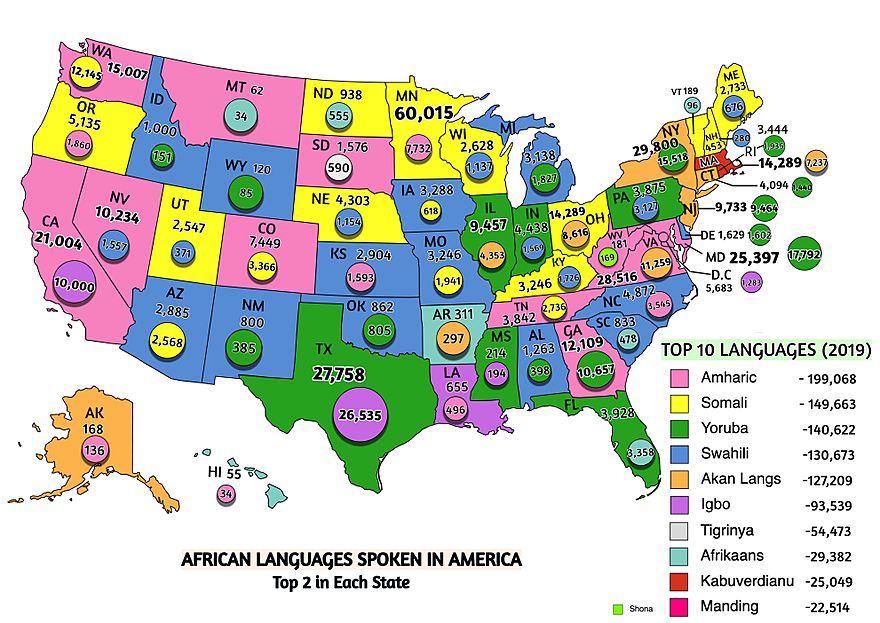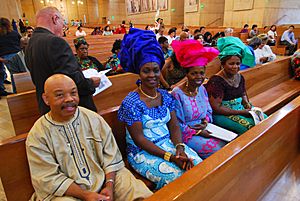Nigerian Americans facts for kids
| Total population | |
|---|---|
| 461,695 (ACS, 2019) 392,811 Nigerian-born (ACS, 2019) |
|
| Regions with significant populations | |
| Texas (especially Houston), Maryland, California, New York, Florida, Georgia, Illinois, New Jersey, Minnesota, Pennsylvania, Massachusetts, Rhode Island | |
| Languages | |
| Predominantly English (American, Nigerian), Pidgin, Igbo, and Yoruba (and other Southern Nigerian languages such as Nupe and Ibibio) |
|
| Religion | |
| Predominantly Christianity (Protestantism, Roman Catholicism, Anglicanism) |
|
| Related ethnic groups | |
| Nigerian Canadians, British Nigerians, Nigerian Australians, African Americans |
Nigerian Americans are people in the United States who have Nigerian family roots. They are a growing group in the U.S. In 1980, there were about 25,000 Nigerian immigrants. By 2019, this number grew to over 461,000 people of Nigerian ancestry. About 392,000 of them were born in Nigeria.
Nigeria sends more migrants to the United States than any other African country. A study looking at the DNA of people of African descent in the U.S. found that Nigeria was the most common country of origin. Most Nigerian Americans come from southern Nigeria, rather than the northern parts of the country.
Contents
History of Nigerians in America
Early Arrivals: The Slave Trade (1600s – 1808)
The first people from what is now Nigeria came to the United States unwillingly. They were brought by force as enslaved people. Places like Calabar and Badagry in Nigeria were major ports where enslaved people were taken from Africa to the Americas. Most of these ships were English.
After hundreds of years, many African Americans found it hard to trace their ancestors back to specific groups or regions in Africa. This was because of the lack of records during slavery. Most enslaved people taken from Nigeria were likely from the Igbo or Yoruba groups. Other groups, like the Fulani and Edo, were also captured. Many Igbo people were sent to Maryland and Virginia. In the 1700s, about 30,000 Igbo people were brought to Virginia from Calabar. Later, some Igbo descendants moved to Kentucky.
Enslaved people often had traditional marks, like tattoos or scars, that could help them find others from their group. However, few managed to escape. Slavers tried to stop traditional customs and mixed people from different groups. This made it harder for them to communicate and plan rebellions.
In 1808, U.S. President Thomas Jefferson officially ended the Atlantic slave trade. However, some enslaved Africans were still brought in illegally. Slavery itself continued until the American Civil War.
Modern Migration (1960s – Today)
Today, most Americans with Nigerian roots are people who chose to move to the U.S. and their children. In the 1930s and 1940s, some Nigerian leaders, like Nnamdi Azikiwe, studied in the United States.
In 1965, a new law called the Immigration and Nationality Act of 1965 made it easier for people from all over the world to move to the U.S. This led to more Nigerians coming. At first, many Nigerians came to study at U.S. universities. The Nigerian government even helped pay for their education in the 1960s and 1970s.
However, Nigeria faced political problems and military rule. This made it hard for many skilled Nigerians, like doctors and lawyers, to return home. So, many stayed in the U.S.
In the 1980s, even more Nigerians moved to the United States. They were looking for better lives for their families. Many professionals and middle-class Nigerians came, taking advantage of education and job chances in the U.S. This movement of skilled people leaving Nigeria is sometimes called a "brain drain."
Since 1980, the number of Nigerians born outside the U.S. has grown from 25,000 to over 392,000 in 2019.
Life in America
Education and Success

Nigerian Americans are known for being highly educated. Research from Rice University shows they are the most educated group in the United States.
According to the U.S. Census Bureau, about 61% of Nigerian Americans aged 25 or older have a bachelor's degree or higher. This is much higher than the 28% for the total U.S. population. Also, 29% of Nigerian Americans have a master's degree or higher, compared to 11% of all Americans.
Nigerian culture has always valued education. People see it as a way to achieve financial security. Many Nigerian Americans have made important contributions in medicine, science, technology, arts, and literature.
- Examples of notable Nigerian Americans:
- Oyekunle Olukotun is a professor at Stanford University who helped create the "multi-core processor" for computers.
- Ngozi Okonjo-Iweala was the first woman to lead the World Trade Organization (WTO).
- Tanitoluwa Adewumi is a young chess champion who started as a refugee.
- Dr. Bennet Omalu was a doctor whose story about brain injuries in sports was made into the movie Concussion.
- Emmanuel Acho hosts a popular online show called Uncomfortable Conversations with a Black Man.
Many black students at top universities are immigrants or their children. For example, at Harvard University, more than one-third of black students are recent immigrants or their children. Other top schools like Yale and Princeton see similar trends.
Many Nigerian students also study in the U.S. The top universities for Nigerian students include Texas Southern University and the University of Houston.
Income and Financial Well-being
In 2018, Nigerian American households earned more money on average than all U.S. households. Their median household income was about $68,658, higher than the national average of $61,937. Also, fewer Nigerian Americans live in poverty compared to the U.S. national average.
Where Nigerians Live in the U.S.
As of 2013, about 252,000 Nigerian immigrants lived in the U.S. This is the largest group of Nigerian migrants in any country.
The states with the most Nigerian-born residents are:
- Texas
- Maryland
- New York
- California
- Georgia
- Illinois
- New Jersey
- Florida
- Massachusetts
- Pennsylvania
- North Carolina
Religious Beliefs

The Nigerian community in the United States has different religious beliefs. About 70% are Christian, 28% follow Islam, and a small number practice other religions.
Traditional Clothing
Nigerian Americans often wear traditional Nigerian clothing for special events. These outfits are usually made from fabrics imported from Nigeria. They are worn for weddings, Independence Day, birthday parties, and Muslim Eid celebrations.
This traditional clothing has also influenced fashion in the U.S. For example, clothes worn during Kwanzaa celebrations often show Nigerian influences. Famous people like Solange Knowles and Erykah Badu have also worn Nigerian-inspired designs. Nigerian American designers are now mixing traditional colors with Western styles, creating popular clothes for young people.
Nigerian American Ethnic Groups
Nigerian Americans can be grouped by Nigeria's three largest ethnic groups: the Igbo, Yoruba, and Hausa-Fulani.
Igbo Americans
Igbo Americans are people in the United States who identify with the Igbo ethnic group. Many moved to the U.S. after the Nigerian Civil War (1967–1970).
Yoruba Americans
Yoruba Americans are Americans who have Yoruba family roots. The Yoruba people come from southwestern Nigeria and southern Benin in West Africa. The first Yoruba people arrived in the U.S. as enslaved people during the Atlantic slave trade. They were one of the main groups from which present-day Nigerians in the U.S. descend, along with the Igbo.
The Yoruba language is mainly spoken in Nigeria and Benin. A version of the language, Lucumi, is used in the Santería religion in the Caribbean.
Fulani and Hausa Americans
Fulani and Hausa Americans are people in the United States who identify with the Fulani and Hausa groups. Most speak Hausa and English fluently. The first Fulani and Hausa immigrants also arrived during the Atlantic Slave Trade. More recently, many came in the 1990s. They now form a large part of Muslim communities across America.
Organizations
There are many Nigerian American organizations in the U.S. that help their communities. These groups promote fellowship, community values, and cultural heritage. They also work to improve the lives of their members and contribute to both Nigeria and the United States.
- Some examples include:
- Nigerian Union Diaspora (NUD)
- Nigerian American Multicultural Council (NAMC)
- The Alliance of Nigerian Organizations in Atlanta, Georgia
- The Nigerian Ladies Association of Texas (NLAT)
- The Nigerian American Multi Service Association (NAMSA)
- National Council of Nigerian Muslim Organizations in USA
- Nigerian Lawyers Association (NLA)
- The Association of Nigerian Physicians in the Americas (ANPA)
- Nigerian Nurses Association USA
- Nigerian Student Association
Notable People
See also
- Africans in the United States
- History of Nigerian Americans in Dallas–Fort Worth
- Nigeria–United States relations
Images for kids




